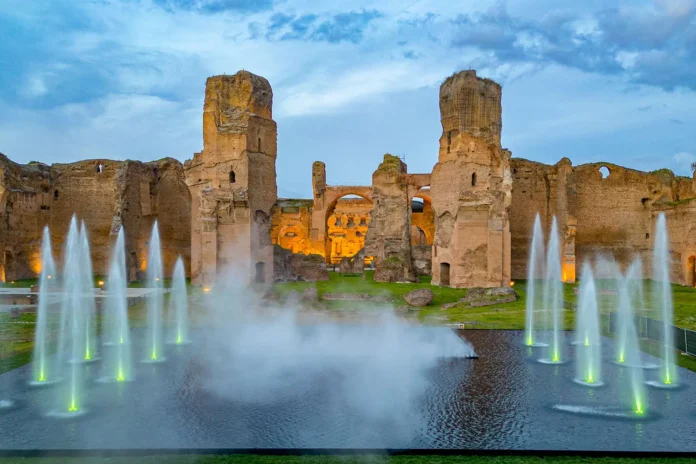Rome’s historic Baths of Caracalla have recently experienced a revival as water flowed through its ancient conduits for the first time in a millennium, attracting tourists and locals alike to witness this remarkable event. The baths, built during the Roman Empire’s peak in the third century AD, once served as a luxurious public bathing complex, showcasing the opulence and engineering prowess of the time.
The return of water to the Baths of Caracalla marks a significant moment in the preservation and restoration efforts of Rome’s rich cultural heritage. The restoration project, undertaken by the city’s authorities, aims to revive these ancient structures and bring them back to life for visitors to enjoy. The sight of water flowing through the intricate network of aqueducts and channels evokes a sense of awe and wonder, transporting visitors back in time to the grandeur of ancient Rome.
Tourists from around the world are flocking to the Baths of Caracalla to witness this historic moment and immerse themselves in the city’s rich history. The resurgence of interest in Rome’s ancient landmarks reflects a growing appreciation for the cultural significance of these sites and the importance of preserving them for future generations.
Local residents, too, are embracing the revival of the Baths of Caracalla, taking pride in their city’s rich heritage and cultural legacy. The reopening of these historic baths not only provides a glimpse into Rome’s glorious past but also offers opportunities for cultural exchange and community engagement.
Visitors to the Baths of Caracalla can explore the sprawling complex, marveling at the well-preserved mosaics, statues, and architectural features that adorn the site. Guided tours offer insights into the history and significance of the baths, allowing visitors to gain a deeper understanding of ancient Roman society and culture.
As Rome continues to attract tourists with its timeless allure and storied past, the reopening of the Baths of Caracalla serves as a reminder of the city’s enduring legacy and its commitment to preserving its cultural heritage. With water once again flowing through its ancient chambers, the Baths of Caracalla stand as a testament to Rome’s rich history and enduring beauty.
As visitors explore the Baths of Caracalla, they are transported back in time to an era of lavish indulgence and communal bathing rituals. The grandeur of the complex, with its towering walls and sprawling courtyards, reflects the power and wealth of the Roman Empire at its peak. The sight of water flowing through the baths’ intricate network of channels and pools adds to the immersive experience, allowing visitors to imagine themselves as ancient Romans enjoying the luxuries of the thermal baths.
Beyond its historical significance, the reopening of the Baths of Caracalla also holds economic benefits for Rome. The influx of tourists drawn to this iconic landmark provides a much-needed boost to the city’s tourism industry, supporting local businesses and creating job opportunities in the hospitality sector. Additionally, the restoration project itself has generated employment opportunities for skilled workers and artisans involved in preserving and renovating the ancient site.
The reopening of the Baths of Caracalla represents a triumph of restoration and conservation efforts, demonstrating the city’s commitment to safeguarding its cultural heritage for future generations. By investing in the preservation of its ancient landmarks, Rome ensures that these iconic sites continue to inspire and educate visitors from around the world for years to come. As tourists marvel at the beauty and engineering marvels of the Baths of Caracalla, they become part of a timeless legacy that connects the past with the present.
The reopening of the Baths of Caracalla in Rome symbolizes the city’s enduring legacy as a custodian of history and culture. With water once again flowing through its ancient chambers, the baths serve as a reminder of Rome’s illustrious past and its ongoing commitment to preserving its cultural heritage. As visitors explore this architectural marvel, they are not only treated to a glimpse of ancient Rome but also become participants in the continued story of one of the world’s greatest civilizations.

